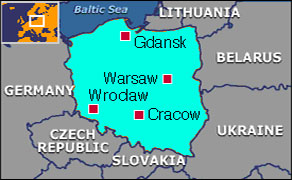Information
The millennium of Gdansk was officially celebrated in 1997, but most historians date the founding of the city to around A.D 980. It was originally set up by Polish King Mieszko I as an outpost on the Baltic sea. 'Gyddanyzc' was mentioned in the adventures of the ill-starred St. Adalbert, a Czech bishop who set out to convert the wild Prussian tribes on the Baltic. Like many saints, he came to a rather sticky end, much to the shock of his patron, the Polish King Boleslaw the Brave (r.992-1025).
The Prussian tribes continued to be a thorn in the side of the Polish crown, and in 1226 Prince Konrad of Mazovia decided on drastic measures to pacify the area. He called in the Teutonic Knights, who had for some time been helping the King of Hungary in keeping the Tartars at bay. The Teutonic conquest of Prussia was a gradual struggle that was not completed until 1283. From henceforth the region continued life as the Knights' private fiefdom, the headquarters of which were the gargantuan stronghold of Marienburg (Malbork).
However, the ambitions of the Knights, who had brought order by fire and sword, continued to grow. The port city of Gdansk, an independent minded enclave with a mixed population of Poles and Germans, fell victim in 1308, when virtually the entire population was eliminated.
The next century saw an ongoing war between the Poles and the Teutons, but after the historic Battle of Grunwald (1410) the Knights were on the wane. The Prussians themselves placed their loyalties with the Polish Crown, and ejected the Knights from Gdansk. This loyalty to the Poles eventually gave rise to Gdansk's monopoly over the Baltic Trade, with the grateful Polish King granting many privileges to the emerging Duchy.
Over the next two centuries Gdansk flourished. Like Poland itself, the Duchy of Royal Prussia was a land with a mixed population. Polish tolerance in matters of religion saw vast influxes of settlers from abroad, most notably Germans, Scots and Dutch. This cosmopolitanism was reflected in Gdansk's eclectic archtecture as can still be witnessed today.
Gdansk lay at the mouth of the River Vistula, and grain and timber from across Poland was sold there. This was at a time when Poland was known as the 'granary of Europe', and both Gdansk merchants and Polish nobleman flourished. Artisans' trade blossomed, and some of the most refined furniture and silverware of the day was created in Gdansk, much of it finding its way into the houses of the Polish nobility. In the meantime, Gdansk developed a considerable reputation in academia, giving rise to such luminaries as Hevelius, Daniel Fahrenheit and Arthur Schopenhauer.
With the partitions of Poland by Russia, Austria and Western Prussia, Gdansk was incorporated into Greater Prussia in 1792, and ultimately into the German Empire. The loss of a host of mercantile privileges left the inhabitants of Gdansk somewhat depleted in stature, yet the city assumed the role of a prosperous provincial outpost.
After the First World War the Allies dithered over whether they should hand Gdansk to the Germans or the newly resurrected Poland. Eventually it was designated a Free City, but by then, the predominantly German population were loyal to Germany. Lacking their own seaboard on the Baltic, the Poles were obliged to build their own port in neighbouring Gdynia, which was detrimental to the economy of Gdansk. The 'Gdansk Corridor' was a major propaganda tool for Adolf Hitler, and ultimately it was at Gdansk where the first shots of the war were fired, from the German battle-cruiser Schleswig Holstein.
The liberation of the city in 1945 by the Soviets flattened all but 10% of this ancient city. The Germans themselves were compelled to march to the new Germany - some 100,000 Danzigers perished during the war and the evacuation, the vast majority in the closing phases of the conflict.
With Danzig handed to the Poles and re-christened Gdansk, the painstaking job of rebuilding began. It was widely considered to be a far greater success than that of Warsaw. The city's new inhabitants were largely drawn from Polish nationals from the states of Lithuania and Belarus, and it took some time for the city to develop an identity of its own.
The Solidarity revolution of 1980, which took root at Gdansk shipyards, brought the world's attention to the city - it was a surprise development that no one had predicted. Whilst the movement eventually saw out the communist regime, the shipyards themselves have followed a more doleful path. However, in contrast to this decline, Gdansk itself has emerged at the forefront of the post-communist boom, whilst Gdynia maintains the highest income per capita in the country. Today, the Tri-City of Gdansk, Sopot and Gdynia seems poised at an exciting juncture in its history.
 Population: 39 million Capital: Warsaw Major language: Polish Major religion: Christianity Life expectancy: 68 years (men), 77 years (women) Monetary unit: 1 zloty = 100 groszy Main exports: Machinery and transport equipment, foodstuffs, chemicals Average annual income: US $11,300 Internet domain: .pl International dialling code: +48
Population: 39 million Capital: Warsaw Major language: Polish Major religion: Christianity Life expectancy: 68 years (men), 77 years (women) Monetary unit: 1 zloty = 100 groszy Main exports: Machinery and transport equipment, foodstuffs, chemicals Average annual income: US $11,300 Internet domain: .pl International dialling code: +48
About Gdansk
Positioned at the centre of Europe, Poland has known turbulent and violent, as well as prosperous times. There have been periods of independence as well as periods of domination by other countries. Several million Polish people, half of them Jews, died in World War II.
In 1989 Poland became the first of the eastern European countries to overthrow Communist rule, following years of demonstrations, strikes and underground political movement led by the Trades Union movement Solidarity. Despite strong Russian objections, Poland joined NATO in 1999 and joined the EU in May 2004.
Poland has achieved some success in creating a market economy and attracting foreign investment. However, unemployment is high and incomes and growth low. The huge farming sector is unwieldy and very inefficient, many farms still retaining their medieval land divisions into inefficient, long strips. In spite of this, Poland's agricultural output is greater than that of Great Britain, France and Italy combined, which is why future EU subsidy levels have been a major area of controversy. Corruption has been singled out by the European Commission as a particularly major problem which must be urgently addressed, as well as the necessity to improve border controls.
The Roman Catholic church, a very strong force in Polish life, has expressed concern that modern lifestyles are corrupting moral values. The church has been involved in heated debates over issues such as worship in schools and abortion.
Comments
We are visiting Gdansk soon. I liked to know if there is any open air market place on the 2. - 3. of December? I noticed your Christmasmarket but we leave on Monday! Thank you!
ReplyI have a question maybe you all could help me.. I wanted to know what the temperature is usually like in the month of June?
ReplyDear Mr. Stupid. You seem to be looking for information in the wrong place. How stupid of you!!
Replybeauty city,and good persons..more dificult speak to poland!(not is a problem and persons to region..smiles from pronuntation,good fast,and beauty ladies!!(ah!¿¿one good hotel??..HOTEL FALCO TO ***!,good prices,and more good personal to work in reception (-not problems)...ah i,m single men!!..ja,ja
Replyit is easy- don't worry :) tourists are very welcome here and the city is generally prepared for them - you will always find some signs and directions (+ tourist attractions, but they may promise more than they deliver) as for the language, almost all young people can communicate in english - in polish school this language is compulsory. the rest of citizens speak basic english or they could help you in german or russian.
ReplyMy grandfather left on a ship when he was 16 before WW11, so he would not be recruited into the war. I would love to visit this city, but would I be safe. I do not speak polish. Is it easy to get around, and find places to stay
ReplyI am just in·quir·ing about bringing animals from gdansk airport into the uk and what are the laws in place! or is there any other airport in poland we can fetch animals into the uk! any help or information would be a great help! thanks Lee
ReplyWho to contact regarding hiring marine personnel? Would someone please let me know. Thank You.
ReplyI'm doing a report on Poland and this helped a lot! I love to meet new people and see new places and I would love to go to Gdansk someday! :-)
ReplyHope to visit Gdansk in October 2009 with a group of scouts. How good is the transport from the airport to the city.
ReplyI hope to visit your city soon. My daughter married a delightful Polish boy. They are visiting your city during the Christmas Holidays. I miss them!
Replylook for gabriela ulatowski. a viola player, about 50 years old, with a 19 year old son, and husband, piotr, who is pianist. thanks, will segen, san francisco
ReplyI was surprised to find out that the infamous Ernst Stavro Blofeld was born in Gdynia of a Polish father and a Greek mother on May 28th, 1908.
ReplyI wonder if you can help with some information regarding appartments for rental on long term basis as I will be studying in gadansk .can you give some contact adds or agents that I can ask.
Replyour choir will stay in September in Poland. Our locations are Gdansk and Chelmno. We still have booked hotels but we are looking for a cheap bus tour operator as we need transfers to and from the airport, form Gdak to Chelmno and would like to make some excusions (e.g. Malbork, Torun).
ReplyDo you have a link for bus travel to/from Gdansk to local Polish cities? We plan to spend four nights in Gdansk and would like to make some day trips to Malbork, Gniew, & Frombork. Thanks, Tim
ReplyI will visit with my sailboat and crew where can i lay in harbour. boat are 44feet .Need some info for us with own yaht.Thanks
ReplyDear Sirs! I would like to ask you for some informations about Passenger ships from Gdansk to Riga or Tallin via Klaipeda. Thank you very much. Wolfgang Köthmann Lindemoosweg 17 D 82327 Tutzing-Traubing
Reply